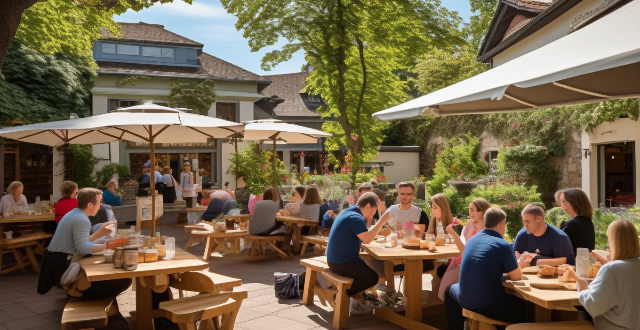Exploring a culture through its cuisine during travels can be achieved by embracing local eateries, visiting markets, taking cooking classes, dining with locals, attending food festivals, reading and researching, and asking questions. This immersive experience allows travelers to understand the history, traditions, and essence of a place through every dish and ingredient.

Learning about a Culture through Its Cuisine during Travels
Exploring the cuisine of a destination is one of the most delightful ways to immerse yourself in its culture. Food is not just sustenance; it's a reflection of history, traditions, and the essence of a place. Here's how you can learn about a culture through its cuisine:
1. Embrace Local Eateries
- Street Food Stalls: Often, the best food experiences are found at street vendors where locals gather. These spots offer authentic tastes at affordable prices.
- Family-Owned Restaurants: Look for places where generations of families have been cooking traditional dishes. They usually have secret recipes passed down through the family.
2. Visit Local Markets
- Ingredients: Observe the ingredients used in local cooking. This will give you insight into what's grown or produced regionally.
- Preparation Methods: Watch how vendors prepare their foods. It can tell you a lot about the cooking techniques and flavor preferences of the region.
3. Take Cooking Classes
- Hands-On Experience: Participating in a cooking class allows you to practice making dishes under the guidance of an expert.
- Cultural Context: Instructors often share stories about the cultural significance of the dishes you're preparing.
4. Dine with Locals
- Home-Hosted Meals: Websites like MealSharing or EatWith connect travelers with locals who are willing to share a meal in their home.
- Cultural Exchange: Over a meal, you can ask your host about their food customs, etiquette, and favorite dishes.
5. Attend Food Festivals
- Variety: Food festivals showcase a wide range of local specialties, sometimes with a historical context provided by organizers.
- Community Involvement: Festivals are a communal event where everyone, from chefs to ordinary folk, participates in celebrating their culinary heritage.
6. Read and Research
- Local Food Blogs: Find blogs written by local food enthusiasts to get an insider's perspective on must-try dishes.
- Food Guides: Pick up a guidebook that specializes in food tours or check online resources for recommendations.
7. Ask Questions
- Engage with Servers: Servers are knowledgeable about the food they serve. Ask them for recommendations or the story behind certain dishes.
- Talk to Other Travelers: Sometimes fellow travelers have already discovered hidden gems or learned interesting facts about local cuisine.
By employing these strategies, you'll not only enjoy delicious meals but also gain a profound understanding of the cultural fabric that weaves itself through every dish and ingredient. Remember, every bite is a journey through history and tradition. Bon Appétit and happy cultural exploration!